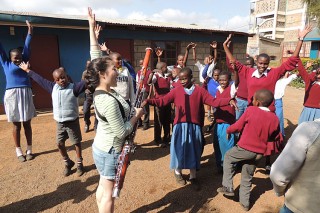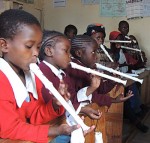Title

Bassonist Midori Samson (pictured), Pre-College flute alum Christina Hughes, and two fellow musicians taught students at the Rise and Shine Academy in Kenya this summer.
Trade Winds is a nonprofit woodwind quintet co-founded by fourth-year bassoonist Midori Samson. The ensemble is committed to music education, and its members spent three weeks teaching, performing, and collaborating in Kenya last summer supported in part by a Juilliard Summer Grant. In addition to Samson, the members of the group are clarinetist Brian Gnojek, oboist Ellen Hindson, flutist Christina Hughes (Pre-College ’08), and horn player Nick Walls.
Body
The facts alone are enough for me to be proud of our work in Kenya. This summer, Trade Winds started meaningful partnerships with six schools, performed 10 times in settings ranging from concert halls to Maasai villages, and made music with more than 300 Kenyan children. However, what made me the most proud of my three weeks in Africa were the deep connections I made with those children—children who, without music, I would have never gotten to meet.
Those connections were cultivated inside the bright blue walls of the Rise and Shine Academy, where Trade Winds taught for two weeks. Surrounded by sweet-smelling eucalyptus trees, the school is a quiet escape tucked in the back of Nairobi’s bustling Kawangware slum. It is a private school (tuition is the equivalent of $10 each month) where students ages 3 to 20 are expected to stay on a rigorous track with the goal of attending college. However the school does not offer music classes. This fact, along with its commitment to education, made the Rise and Shine Academy the perfect partnering institution for Trade Winds.
During our daily classes the students composed music, took part in guided listening to orchestral masterpieces, and learned to play the recorder (the latter thanks to a generous donor who gave 150 instruments to our project and Rise and Shine). Each day concluded with a journal reflection period. Every night, we read and responded to those journal entries, which allowed us to communicate with each student individually and check in on how they were doing in class. It also gave the students another way to express their realities, which could be eye-opening to us. When we asked the students to reflect on the question “How is music important to you,” Manoah, a 16-year-old boy, responded, “I like music because it slows down my temper when I have hunger.”
When we asked the questions “What is a community?” and “What is your role in your community?” all the responses really stood out, so the next day, we split the class into small groups to compose song verses using their journal responses. Then we asked the students to combine the verses into a class song. The result was stunning. In just 40 minutes, this class of teenagers composed a soulful R&B-type song complete with harmonies and a clapping accompaniment. The music was quite beautiful and expressive; the lyrics honest and real. They called it “Community.”
A community is a group of people who share a common goal. I have an important role in my community. We are here together to help each other.
My role in the community is helping the needy. I help my family, and I work. My community needs me.
My role in the community is to help elders and poor. This is my role in the community. My community really needs me.
My role in the community is helping the poor. Sharing ideas, common goals, and visions. My community needs me.
The piece came to life even more when the students stood and, on the last day of our two-week workshop, proudly performed it for their peers. I could see their joy in performing, and then as I listened to their song echo across Kawangware, I felt something I too often forget as I slave away in the practice room: I felt truly lucky to be a musician.
I saw the power music had to bring joy to this school and beyond—several students excitedly told me they had taught the song to their parents and sung it in church. I was conscious of how special it is for me to even entertain the idea of pursuing music as a career while so many people, including children like Manoah, deal with hunger daily. I saw a real example of what it looks like to be fearlessly expressive and creative on stage.
After returning to the U.S., I still remind myself of these things every day. Rather than get frustrated and smash my reed when I can’t get a passage perfectly clean and in tune, I pause. I think back to the things I learned about what it truly means to be a musician, and just how lucky I am. I say to myself, Asante sana, Nairobi. Thank you, Nairobi. And I try the passage again.





